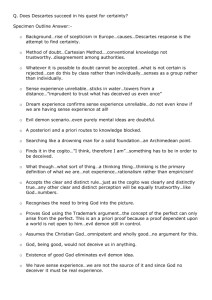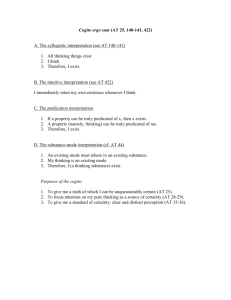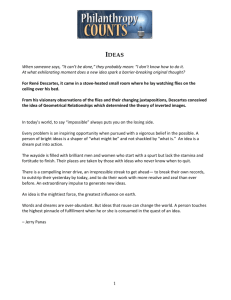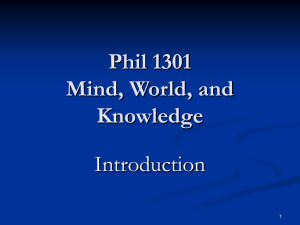Descartes( Wolff,(pages(49265( Sophie’s(World(Chapter(18(
advertisement
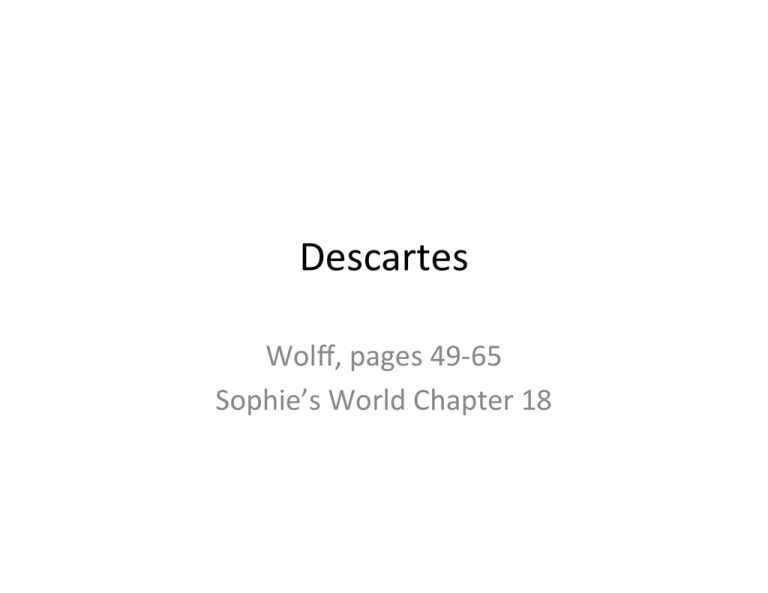
Descartes( Wolff,(pages(49265( Sophie’s(World(Chapter(18( Background( • • • • 159621650( French( Devout(Catholic((educated(by(Jesuits)( IniJally(interested(in(mathemaJcs(and(physics( – Father(of(analyJc(geometry,(contributed(to( advancements(in(algebra;(Cartesian(plane( • Father(of(modern(philosophy( – Medita'ons+on+First+Philosophy,(1641( • Rejected(convenJonal(wisdom,(established( doctrine,(and(the(authority(of(the(ancients( Discourse(on(Method( • 1637:(“Discourse(on(the(Method(of(Rightly(ConducJng( the(Reason(and(Seeking(for(Truth(in(the(Sciences”( – Four(Parts( • “The(first(of(these(was(to(accept(nothing(as(true(which( I(did(not(clearly(recognize(to(be(so…”( • “The(second(was(to(divide(up(each(of(the(difficulJes( which(I(examined(into(as(many(parts(as(possible…”( • “The(third(was(to(carry(on(my(reflecJons(in(due( order…”( • “The(last(was…make(enumeraJons(so(complete(and( review(so(general(that(I(should(be(certain(of(having( omi_ed(nothing.”( Discourse(on(Method( • Method(of(Inquiry( – Method(for(finding(things(out(and(being(sure(you( have(them(right( – Not(to(prove(what(you(already(know( – Similar(to(Socrates?( • Method(of(Doubt( – Do(not(accept(something(as(true(unless(you(have( absolute(certainty( – Cannot(completely(trust(your(senses( – Similar(to(Plato?( Cogito,(ergo(sum.( • “I(think,(therefore(I(am.”( – Did(not(doubt(his(own(existence( • Idea(of(perfect(enJty(comes(from(God( – Self2evident(to(Descartes(that(God(existed,(idea(of( God(is(innate( • Two(realiJes((dualism)( – Thought(and(Extension((ma_er)( – Mind(is(purely(conscious( – Ma_er(takes(up(space(and(can(be(divided((but(has(no( conscious)( – Thought(is(independent(of(ma_er(in(humans( Mind(and(Body( • Man(thinks,(but(also(takes(up(space((thought( and(ma_er)( • Bodily(funcJons(do(not(rely(on(mind( • Mind(acts(independently(from(bodily(funcJon( • Mind(and(body(do(have(constant(interacJon( – Thought(can(be(affected(by(feelings(related(to( bodily(needs( – Ability(to(behave(raJonally( Epistemological(Turn( • Pre2SocraJcs(!(Descartes( – QuesJons(of(being(came(before(quesJons(of( knowing( – The(philosophy(of(Descartes(flips(this(order( • Differing(with(Aristotle(on(physics( • Epistemological(SkepJcism( Philosophical(Responses(to(Descartes( • The(“problem(of(certainty”( • RaJonalists( – Sought(to(discover(ways(of(establishing(principles(of( science(and(metaphysics(with(mathemaJcal(certainty( – Sought(proofs(for(the(existence(of(God( – Downgraded(senses(as(a(source(of(knowledge( • Empiricists( – Argued(that(nothing(could(meet(the(demand(of(the( raJonalists( – Challenged(raJonalists(reliance(on(reason(as(sole( source(of(knowledge( RaJonalism(and(Empiricism( Wolff,(pages(61282( Problem(of(Certainty( • Cogito(Argument( • Solipsism( • Two(types(of(beliefs( – Based(on(the(senses( – Based(on(reasoning(with(general(concepts( • Problem(of(certainty( – Clear(and(disJnct( a(priori(vs.(a(posteriori( • A(priori2knowledge(reached(through(deducJon( – conclusions(are(based(on(intuited(premises(and(valid( arguments( – ArithmeJc,(geometry( – RaJonalism( • A(posteriori2knowledge(dependent(on(experience( – Sensory(percepJon/experience(necessary(to(trigger( thinking(and(understanding(of(the(world( – Physics,(chemistry,(biology( – Empiricism( Leibniz(and(RaJonalism( • The+Monadology2two(types(of(truths+ – Truths(that(can(be(known(by(applicaJon(of(a( fundamental(principle(of(logic( • Law(of(ContradicJon(and(Law(of(the(Excluded(Middle( • NegaJon( – Truths(of(fact—knowledge( Locke(and(Hume2empiricists( • John(Locke2tabula(rasa( • David(Hume2A+Trea'se+on+Human+Nature( – Impressions/percepJons(vs.(ideas( – Simple(and(complex( – Copy(theory(of(ideas( – Ability(of(the(mind(to(separate(“units”(of( sensaJon( Immanuel(Kant( • claimed(that(knowledge(was(impossible(without( accepJng(truths(from(both(raJonalist(and( empiricist(schools(of(thought( • Unity(of(Consciousness( • “Categories”( • “There(can(be(no(doubt(that(all(our(knowledge( begins(with(experience.(But(though(all(our( knowledge(begins(with(experience,(it(does(not( follow(that(it(all(arises(out(of(experience.”(( • “Concepts(without(percepts(are(empty;(percepts( without(concepts(are(blind.”( Epistemology(Review( Epistemology( • The(study(of(knowledge( • What(does(it(mean(to(know(something?( • What(are(the(criteria(of(certainty(in( knowledge?( • What(are(the(sources(of(our(knowledge?( • What(limits,(if(any,(are(there(on(what(the( human(mind(can(know?( • Can(we(know(that(we(know?(How?( Descartes( • Discourse(on(Method( – Method(of(inquiry(and(Method(of(doubt( – Leads(to(“epistemological(turn”( • “Clear(and(disJnct”( • Epistemological(skepJcism( • Cogito(argument/solipsism( RaJonalism(vs.(Empiricism( • A(priori(knowledge(vs.(A(posteriori(knowledge( • Leibniz—raJonalist( – Role(of(formal(logic( – Law(of(contradicJon( – Law(of(sufficient(reason( • Tabula(Rasa—John(Locke( • David(Hume—empiricist( – “Every(simple(idea(is(a(copy(of(a(precedent(simple(impression”( • Immanuel(Kant( – Goes(back(to(cogito(argument( – Uses(“categories”(to(explain(“unity(of(consciousness”( – A_empts(to(resolve(debate(between(raJonalism(and(empiricism(

